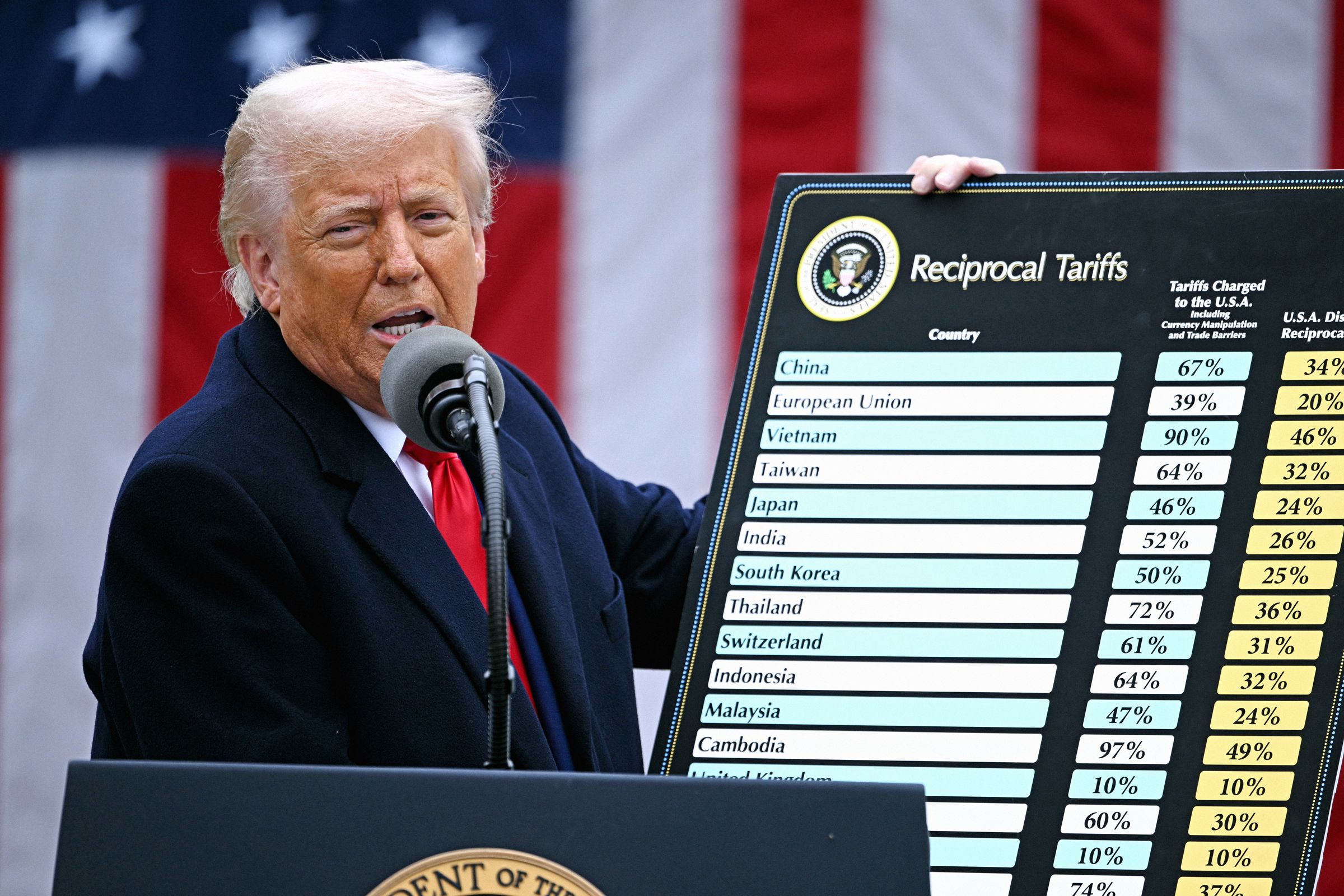Sweeping tariffs unveiled by US President Donald Trump on Wednesday will have ripple effects across the tech industry, according to experts who study global trade. The measures, which include a minimum 10 percent tariff on all countries and steep new import duties on key US trading allies like Europe, China, Vietnam, India and South Korea, sent stocks nosediving in after-hours trading.
Meta and Nvidia stock prices each fell by around 5 percent, CNBC reported, while Apple and Amazon fell around 6 percent. The iPhone maker earns roughly half its revenue by selling phones that are manufactured in China and India, while some of its other products are manufactured in Vietnam. Amazon’s online shopping marketplace is similarly heavily dependent on goods sold by third-party merchants in China.
These market dips may be just the beginning. Many economists warn that the White House has set in motion one of the largest shifts in global trade in decades, and among the results could be higher prices for US consumers and more inflation. Earlier this week, Goldman Sachs raised the probability of a US recession in the next 12 months to 35 percent, up from 20 percent.
“There’s this idea that consumers are willing to pay higher prices for American goods,” says Tibor Besedes, a trade expert and professor at the School of Economics at the Georgia Institute of Technology. “There’s no evidence of that ever taking place.”
Besedes adds that one reason Americans said they voted for Trump was because they were displeased with inflation during the Biden administration, and he can’t imagine they’ll be happy about prices potentially rising now.
Some of the new country-specific tariffs, such as those levied on the United Kingdom, Chile, and Brazil, are relatively low. Others, such as those levied on China, Cambodia, Vietnam, Taiwan, India, and Thailand, are much higher, ranging from 26 percent to 49 percent. (Trump even targeted islands that aren’t independent countries, some with no exports or human inhabitants.)
For now, at least, Trump has given an exemption to one crucial category of tech imports: semiconductors. That means US companies like Nvidia, which puts advanced chips made by Taiwan Semiconductor Manufacturing Company (TSMC) inside their AI graphics processing units, won’t have to pay the 32 percent tariffs Trump imposed on Taiwan. It’s not immediately clear, however, if TSMC would still be subject to the blanket 10 percent tariff Trump also announced. Overall, about 44 percent of logic chips imported to the US come from Taiwan, according to one estimate.
Within the tech sector, Trump’s tariffs could deal perhaps the biggest blow to ecommerce. “Online retailers will feel the pain, and so will consumer device brands,” says Ian Bremmer, a political scientist and the founder and president of the consulting firm Eurasia Group.
In addition to introducing sweeping tariffs, Trump signed an executive order on Wednesday ending a trade loophole for packages from China and Hong Kong that allows American consumers to directly import goods to the US valued under $800 without paying anything.
Known as the de minimis exemption, it has been used by the Chinese shopping giants Shein and Temu to send millions of packages to the US each year duty-free, helping keep the prices of their products low for Americans. But the exemption is also important for marketplaces like eBay and Etsy that allow people in the US to buy goods from China-based sellers.
Scrapping the measure may also negatively impact Amazon, which recently launched a division for affordable made-in-China products that competes directly with Temu and Shein. Amazon did not immediately respond to a request for comment.
Trump tried scrapping the de minimis provision for Chinese packages in February via a separate executive order, but he quickly walked back the measure after it became clear that US Customs and Border Protection did not have the resources in place to inspect millions of additional packages a day and ensure the correct associated tariffs were being paid. His new order says the duty-free exemption will go away on May 2, giving CBP a few weeks to prepare.
Ram Ben Tzion, cofounder and CEO of Publican, a digital shipment vetting platform, says he believes Trump intends to use eliminating de minimis as a bargaining chip in negotiations with China, because if the policy is really scrapped and replaced by high tariffs, it could radically reshape online shopping as Americans know it.
“The magnitude and the importance of this, if it does ultimately come into effect, is gigantic,” says Ben Tzion. “It could dramatically change e-commerce. It could dramatically change some of the giants that we have known over the past few years.”
Some tech companies, however, especially those already entrenched in areas like logistics and data analytics, may see opportunities in Trump’s trade policies. Almost immediately after the tariffs were announced, defense contractor Palantir published a blog post promoting an artificial intelligence service that the company boasted integrates “a wide array of data sources” to help businesses ensure that “tariff-related decisions consider the full operational context.”
Jay Gerard, the head of customs and logistics at the Mexico City-based tech and logistics startup Nuvocargo, says that as much as he “hates tariffs,” they’ve created more demand for his company’s services. Nuvocargo operates as a freight broker between Mexico and the US, and sells software that helps customers get their goods across the US border. It also helps them process customs documents. The company is now forecasting an increase in customer activity for April, May, and June, predicting that the tariffs will boost business.
Still, the past month has been “chaos” for importers and shippers, Gerard says, leaving many of them in expensive holding patterns. Early in March, Trumped slapped a 25 percent tariff on Mexican and Canadian imports, only to walk it back a couple days later. During that short time, Gerard says, if a freight truck crossed the border, the importer paid the fee.
“If they imported $100,000 worth of drinks that day,” he explains, “they were paying $25,000 in duties. If the truck crossed a day later, that disappeared.”
Other companies that specialize in logistics seem allergic to the chaos as well. “Historically all chaos has been good for Flexport,” Ryan Petersen, chief executive of the logistics unicorn Flexport, wrote on X. “This might be too much though.”
Nick Vyas, founding director of the Randall R. Kendrick Global Supply Chain Institute at USC’s Marshall School of Business, acknowledges that tariffs are ultimately a tax that gets passed onto consumers. “You and I at some point will pay for it,” he says.
But Vyas believes that tariffs, if implemented strategically, could benefit the US in the long run. Over the past 30 years, he says, the country has shifted from a creation mindset to a consumption mindset, and in the process, has become increasingly reliant on one major node in the global supply chain: China. “When you get into that stage, it’s very addictive. You want to continue to consume by finding the cheapest ways to do it,” Vyas tells WIRED. “But you lose the appetite and knowledge and know how to create something.”
Vyas believes the US should take a multi-tiered approach to trade and manufacturing. First, it should build out infrastructure for advanced manufacturing of semiconductors and defense tech—industries critical to national security. Then, to help rebuild the labor force, introduce apprentice programs for semi-automated industries, like auto manufacturing, while continuing to outsource the production of “widgets,” or small goods, electronics, and accessories that the US would not be able to produce affordably. At the very least, this would be a three-to-five year project, Vyas says.
But that strategy also requires formulating a plan and sticking with it. “The US should create a policy that openly encourages a group of allies,” says Vyas. “Right now, people feel confused, because we’re seeing much more emotional outbursts than strategic ones.”
Additional reporting by Zeyi Yang.




